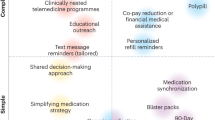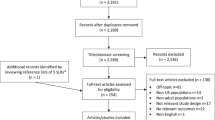Abstract
Non-adherence has been a major concern in the treatment of hypertension and is particularly important in understanding and intervening in patients who appear to have resistant hypertension. Relatively few studies have examined the role of non-adherence in resistant hypertension. This review will address issues related to measurement of adherence, adherence interventions and rates of non-adherence in general hypertensive populations and in patients classified as having resistant hypertension.
This is a preview of subscription content, access via your institution
Access options
Subscribe to this journal
Receive 12 digital issues and online access to articles
$119.00 per year
only $9.92 per issue
Buy this article
- Purchase on Springer Link
- Instant access to full article PDF
Prices may be subject to local taxes which are calculated during checkout
Similar content being viewed by others
References
Calhoun DA, White WB . Effectiveness of the selective aldosterone blocker, eplerenone, in patients with resistant hypertension. J Am Soc Hypertens 2008; 2 (6): 462–468.
Judd E, Calhoun DA . Apparent and true resistant hypertension: definition, prevalence and outcomes. J Hum Hypertens 2014; 28 (8): 463–468.
Burnier M, Wuerzner G, Struijker-Boudier H, Urquhart J . Measuring, analyzing, and managing drug adherence in resistant hypertension. Hypertension 2013; 62 (2): 218–225.
Shi L, Liu J, Koleva Y, Fonseca V, Kalsekar A, Pawaskar M et al. Concordance of adherence measurement using self-reported adherence questionnaires and medication monitoring devices. Pharmacoeconomics 2010; 28 (12): 1097–1107.
Zeller A, Ramseier E, Teagtmeyer A, Battegay E . Patients' self-reported adherence to cardiovascular medication using electronic monitors as comparators. Hypertens Res 2008; 31 (11): 2037–2043.
Sackett DL, Haynes RB, Gibson ES, Hackett BC, Taylor DW, Roberts RS et al. Randomised clinical trial of strategies for improving medication compliance in primary hypertension. Lancet 1975; 1 (7918): 1205–1207.
Steiner JF, Earnest MA . The language of medication-taking. Ann Intern Med 2000; 132 (11): 926–930.
Karve S, Cleves MA, Helm M, Hudson TJ, West DS, Martin BC et al. Good and poor adherence: optimal cut-point for adherence measures using administrative claims data. Curr Med Res Opin 2009; 25 (9) 2303–2310.
Fitzgerald AA, Powers JD, Ho PM, Maddox TM, Peterson PN, Allen LA et al. Impact of medication nonadherence on hospitalizations and mortality in heart failure. J Card Fail 2011; 17 (8): 664–669.
Oleen-Burkey MA, Dor A, Castelli-Haley J, Lage MJ . The relationship between alternative medication possession ratio thresholds and outcomes: evidence from the use of glatiramer acetate. J Med Econ 2011; 14 (6): 739–747.
Watanabe JH, Bounthavong M, Chen T . Revisiting the medication possession ratio threshold for adherence in lipid management. Curr Med Res Opin 2013; 29 (3): 175–180.
Curtis JR, Larson JC, Delzell E, Brookhart MA, Cadarette SM, Chlebowski R et al. Placebo adherence, clinical outcomes, and mortality in the women's health initiative randomized hormone therapy trials. Med Care 2011; 49 (5): 427–435.
Lowy A, Munk VC, Ong SH, Burnier M, Vrijens B, Tousset EP et al. Effects on blood pressure and cardiovascular risk of variations in patients' adherence to prescribed antihypertensive drugs: role of duration of drug action. Int J Clin Pract 2011; 65 (1): 41–53.
Chobanian AV . Impact of nonadherence to antihypertensive therapy. Circulation 2009; 120 (16): 1558–1560.
Hill MN, Miller NH, Degeest S, Materson BJ, Black HR, Izzo JL Jr et al. Adherence and persistence with taking medication to control high blood pressure. J Am Soc Hypertens 2011; 5 (1): 56–63.
Mathes T, Pieper D, Antoine SL, Eikermann M . 50% adherence of patients suffering chronic conditions–where is the evidence? Ger Med Sci 2012; 10, Doc16.
Hyman DJ, Pavlik VN . Poor hypertension control: let's stop blaming the patients. Cleve Clin J Med 2002; 69 (10): 793–799.
Moser M, Franklin SS . Hypertension management: results of a new national survey for the hypertension education foundation: Harris interactive. J Clin Hypertens (Greenwich) 2007; 9 (5): 316–323.
Bramley TJ, Gerbino PP, Nightengale BS, Frech-Tamas F . Relationship of blood pressure control to adherence with antihypertensive monotherapy in 13 managed care organizations. J Manag Care Pharm 2006; 12 (3): 239–245.
Siegel D, Lopez J, Meier J . Antihypertensive medication adherence in the Department of Veterans Affairs. Am J Med 2007; 120 (1): 26–32.
Ndumele CD, Shaykevich S, Williams D, Hicks LS . Disparities in adherence to hypertensive care in urban ambulatory settings. J Health Care Poor Underserved 2010; 21 (1): 132–143.
Bosworth HB, Dudley T, Olsen MK, Voils CI, Powers B, Goldstein MK et al. Racial differences in blood pressure control: potential explanatory factors. Am J Med 2006; 119 (1): 70 e9-15.
Eze-Nliam CM, Thombs BD, Lima BB, Smith CG, Ziegelstein RC . The association of depression with adherence to antihypertensive medications: a systematic review. J Hypertens 2010; 28 (9): 1785–1795.
Haynes RB, Ackloo E, Sahota N, McDonald HP, Yao X . Interventions for enhancing medication adherence. Cochrane Database Syst Rev 2008; 16 (2): CD000011.
Viswanathan M, Golin CE, Jones CD, Ashok M, Blalock SJ, Wines RC et al. Interventions to improve adherence to self-administered medications for chronic diseases in the United States: a systematic review. Ann Intern Med 2012; 157 (11): 785–795.
Gwadry-Sridhar FH, Manias E, Lal L, Salas M, Hughes DA, Ratzki-Leewing A et al. Impact of interventions on medication adherence and blood pressure control in patients with essential hypertension: a systematic review by the ISPOR medication adherence and persistence special interest group. Value Health 2013; 16 (5): 863–871.
Esler MD, Krum H, Sobotka PA, Schlaich MP, Schmieder RE, Bohm M et al. Renal sympathetic denervation in patients with treatment-resistant hypertension (The Symplicity HTN-2 Trial): a randomised controlled trial. Lancet. 2010; 376(9756): 1903–1909.
Worthley SG1 TC, Worthley MI, Sinhal A, Chew DP, Meredith IT, Malaiapan Y et al. Safety and efficacy of a multi-electrode renal sympathetic denervation system in resistant hypertension: the EnligHTN I trial. Eur Heart J 2013; 34, 2132–2140.
Kandzari DE, Bhatt DL, Sobotka PA, O'Neill WW, Esler M, Flack JM et al. Catheter-based renal denervation for resistant hypertension: rationale and design of the SYMPLICITY HTN-3 Trial. Clin Cardiol 2012; 35 (9): 528–535.
Fadl Elmula FE, Hoffmann P, Fossum E, Brekke M, Gjonnaess E, Hjornholm U et al. Renal sympathetic denervation in patients with treatment-resistant hypertension after witnessed intake of medication before qualifying ambulatory blood pressure. Hypertension 2013; 62 (3): 526–532.
Yakovlevitch M, Black HR . Resistant hypertension in a tertiary care clinic. Arch Intern Med 1991; 151 (9): 1786–1792.
Garg JP, Elliott WJ, Folker A, Izhar M, Black HR . Resistant hypertension revisited: a comparison of two university-based cohorts. Am J Hypertens 2005; 18 (5 Pt 1): 619–626.
de Souza WA, Sabha M, de Faveri Favero F, Bergsten-Mendes G, Yugar-Toledo JC, Moreno H et al. Intensive monitoring of adherence to treatment helps to identify ‘true’ resistant hypertension. J Clin Hypertens (Greenwich) 2009; 11 (4): 183–191.
Ceral J, Habrdova V, Vorisek V, Bima M, Pelouch R, Solar M et al. Difficult-to-control arterial hypertension or uncooperative patients? The assessment of serum antihypertensive drug levels to differentiate non-responsiveness from non-adherence to recommended therapy. Hypertens Res 2011; 34 (1): 87–90.
Jung O, Gechter JL, Wunder C, Paulke A, Bartel C, Geiger H et al. Resistant hypertension? Assessment of adherence by toxicological urine analysis. J Hypertens 2013; 31 (4): 766–774.
Brinker S, Pandey A, Ayers C, Price A, Raheja P, Arbique D et al. Therapeutic drug monitoring facilitates blood pressure control in resistant hypertension. J Am Coll Cardiol 2014; 63 (8): 834–835.
Pandey A, Brinker S, Ayers C, Arbique D, Price A, Das S et al Comparison of Morisky Medication Adherence Scale with Therapeutic drug monitoring in resistant hypertension. J Clin Hypertens 2013; 15: 1.
Bunker J, Callister W, Chang CL, Sever PS . How common is true resistant hypertension? J Hum Hypertens 2011; 25 (2): 137–140.
Grassi D, O'Flaherty M, Pellizzari M, Bendersky M, Rodriguez P, Turri D et al. Hypertensive urgencies in the emergency department: evaluating blood pressure response to rest and to antihypertensive drugs with different profiles. J Clin Hypertens (Greenwich) 2008; 10 (9): 662–667.
Untreated mild hypertension. A report by the Management Committee of the Australian Therapeutic Trial in Mild Hypertension. Lancet 1982; 1 (8265): 185–191.
Bunker J, Callister W, Chang C-L, Sever PS . How common is true resistant hypertension?. J Hum Hypertens 2011; 25: 137–140.
Ruzicka M, McCormick B, Leenen FH, Froeschl M, Hiremath S . Adherence to blood pressure-lowering drugs and resistant hypertension: should trial of direct observation therapy be part of preassessment for renal denervation? Can J Cardiol 2013; 29 (12): 1741 e1-3.
Rose AJ, Berlowitz DR, Manze M, Orner MB, Kressin NR . Intensifying therapy for hypertension despite suboptimal adherence. Hypertension 2009; 54 (3): 524–529.
Burnier M, Schneider MP, Chiolero A, Stubi CL, Brunner HR . Electronic compliance monitoring in resistant hypertension: the basis for rational therapeutic decisions. J Hypertens 2001; 19 (2): 335–341.
Daugherty SL, Powers JD, Magid DJ, Tavel HM, Masoudi FA, Margolis KL et al. Incidence and prognosis of resistant hypertension in hypertensive patients. Circulation 2012; 125 (13): 1635–1642.
Daugherty SL, Powers JD, Magid DJ, Masoudi FA, Margolis KL, O'Connor PJ et al. The association between medication adherence and treatment intensification with blood pressure control in resistant hypertension. Hypertension 2012; 60 (2): 303–309.
Sim JJ, Bhandari SK, Shi J, Liu IL, Calhoun DA, McGlynn EA et al. Characteristics of resistant hypertension in a large, ethnically diverse hypertension population of an integrated health system. Mayo Clin Proc 2013; 88 (10): 1099–1107.
Sim JJ, Shi J, Kristi R, Elizabeth M, David C, Kamyar K-Z et al. Longititudinal evaluation of medication adherence among a resistant hypertension population. J Clin Hypertens 2013; 15 (1) A92.
Irvin MR, Shimbo D, Mann DM, Reynolds K, Krousel-Wood M, Limdi NA et al. Prevalence and correlates of low medication adherence in apparent treatment-resistant hypertension. J Clin Hypertens (Greenwich) 2012; 14 (10): 694–700.
Grigoryan L, Pavlik VN, Hyman DJ . Characteristics, drug combinations and dosages of primary care patients with uncontrolled ambulatory blood pressure and high medication adherence. J Am Soc Hypertens 2013; 7 (6): 471–476.
de Oliveira-Filho AD, Costa FA, Neves SJ, de Lyra Junior DP, Morisky DE . Pseudoresistant hypertension due to poor medication adherence. Int J Cardiol 2014; 172 (2): e309–e310.
James PA, Oparil S, Carter BL, Cushman WC, Dennison-Himmelfarb C, Handler J et al. 2014 evidence-based guideline for the management of high blood pressure in adults: report from the panel members appointed to the Eighth Joint National Committee (JNC 8). JAMA 2014; 311 (5): 507–520.
Acknowledgements
We thank Kim Dillman for manuscript preparation.
Author information
Authors and Affiliations
Corresponding author
Ethics declarations
Competing interests
The authors declare no conflict of interest.
Rights and permissions
About this article
Cite this article
Hyman, D., Pavlik, V. Medication adherence and resistant hypertension. J Hum Hypertens 29, 213–218 (2015). https://doi.org/10.1038/jhh.2014.73
Received:
Revised:
Accepted:
Published:
Issue Date:
DOI: https://doi.org/10.1038/jhh.2014.73
This article is cited by
-
Adherence to treatment and harmful effects of medication shortages in the context of severe crises: scale validation and correlates
Journal of Pharmaceutical Policy and Practice (2023)
-
Advanced practice nurse intervention versus usual care for hypertension control: study protocol for an open-label randomized controlled trial
Trials (2023)
-
Cross-cultural adaptation of the Spanish MINICHAL instrument into English for use in the United Kingdom
Health and Quality of Life Outcomes (2022)
-
Prevalence, phenotypic characteristics and prognostic role of apparent treatment resistant hypertension in the German Chronic Kidney Disease (GCKD) study
Journal of Human Hypertension (2022)
-
Refugee and Migrant Health Literacy Interventions in High-Income Countries: A Systematic Review
Journal of Immigrant and Minority Health (2022)



